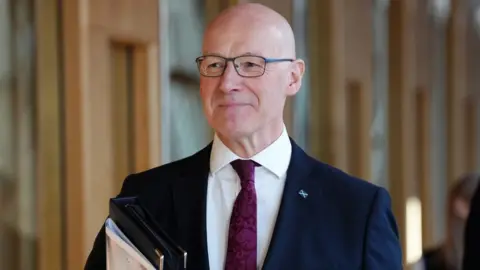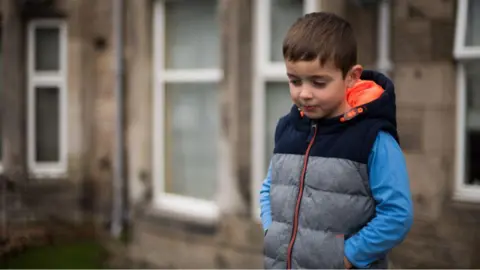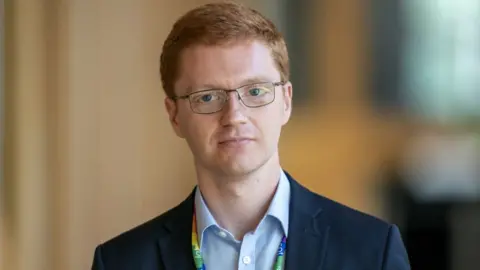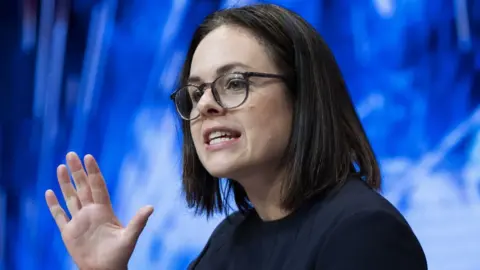SNP spending plan will not ‘move dial’ on child poverty
 PA Media
PA MediaChild poverty campaigners have warned that the Scottish government’s spending plans will not “move the dial” after the first minister said curbing child poverty was his top priority.
Mr Swinney was also attacked for scrapping a pledge to scale up free school meals in his programme for government.
Save the Children Scotland said it was a ‘food bank by another name’ because the programme lacked the ‘funded pledges’ that would help meet child poverty targets.
The Scottish Greens, whose further budget cuts for environmental spending already angered them, have threatened not to support next year’s budget. The Scottish government claims its finances are ‘extremely constrained’.
Meanwhile, ministers said they were obliged to make £500m in savings due to an almost £1bn deficit in the public purse.
In his draft budget for next year, Mr Swinney declared the elimination of childhood poverty as a moral compass for his administration and promised ‘a system of whole family support’.
He told MSPs that he had pledged £3 billion every year to ‘tackle poverty and the consequences of the cost-of-living crisis’.
In addition, the first minister committed to spending almost £1 billion per year on ‘free, high-quality and funded’ early learning and childcare.
 Getty Images
Getty ImagesThe latest figures show that 26 per cent of children are growing up in relative poverty in Scotland – with targets to drop this below 18 per cent by the end of this current financial year and to 10 per cent by 2030-31.
In a positive response to the priority being assigned to child poverty, Fiona King, senior policy and public affairs manager at Save the Children Scotland, said that ‘the clock is now ticking on action.
‘Reality is there is really nothing in this programme for government that actually moves the dial on child poverty,’ she told BBC Radio’s Good Morning Scotland.
‘And we’re worried that we don’t know what the roadmap is to get to 2030.’
Ms King described herself as ‘disgusted’ by the move to axe a commitment to free school meals for P6 and P7 pupils.
‘We can’t have a vibrant economics society if one in four children is playing the deck very hard’
‘But difficult for the Scottish government, it is much, much more difficult for the families who can’t put food on the table, who can’t pay their rent.’
Ms King applauded the Scottish Child Payment, which gives every low-income family £26.70 a week for each child under 16, but she also urged the payment to be increased to £30 this year and to £40 by 2026.
And that the Scottish government was operating in limited budgetary circumstances, she chastised the expenditure of nearly £150 million on a council tax freeze.
“That wasn’t an anti-poverty measure it didn’t help the poorest households,” she said.
Citizens Advice Scotland welcomed the focus on child poverty, but called for more money and ‘meaningful’ co‑operation between the parties.
‘Things are tough’
The Deputy First Minister Kate Forbes told BBC Radio Scotland that ‘public finances are extremely constrained’ and that ‘the facts are that the Westminster government is putting us on a premeditated course of austerity.
Sir Keir Starmer’s government has promised ‘tough choices’ to fill a £22bn deficit in the public coffers, which it will reveal next month.
Ms Forbes said: “We know that things are tough.
We are trying to take all the money as far as it will go into this.’
Have we done enough? Er… no. That’s why it was in the programme for government.
She referred to data indicating that 100,000 kids have been kept out of poverty by the Scottish Child Payment.
The finance secretary maintained that, while ministers wished to provide ‘universal’ primary school meals, this would not be possible until more funding ‘becomes available’.
All pupils in P1 to P5 already have primary school meals provided, and the Scottish government previously promised to roll this out to P6 and P7 by 2026.
But the programme for government makes a commitment to only provide meals to P6 and P7 pupils who receive the Scottish Child Payment.
 PA Media
PA MediaFull details of the SNP’s spending plans won’t be known until next month, when the Scottish budget, scheduled for 4 December, is finalised.
It be the first since the party ended a power-sharing agreement with the Greens.
It left the SNP government with a minority in parliament, meaning that it relies on some opposition MSPs to vote its plans through.
The Scottish Greens have supported every government budget since 2016.
However, they have recently lambasted what they see as backtracks on various measures – including a cut to the nature restoration fund and the active travel budget, and the end of a pilot that abolished peak rail fares.
The Greens opposed the government over free school meals, and after it changed a pledge to end conversion practices.
Ross Greer, their education spokesperson, told BBC Radio Scotland: ‘You don’t get the Greens on side by dumping, or cutting, or unravelling the things we care about.
[I struggle] to see what we are in that sort of situation we were at the end of that parliament over this’.
He continued: ‘If we can’t deliver previous agreements, how can we possibly expect them to deliver on new agreement they might reach later this year.’
 PA Media
PA MediaFollowing First Minister’s Questions, Mr Swinney said that his government must ‘talk to the other parties’ and ‘engage constructively’.
‘We need to find partners who will help us get a budget passed,’ he told reporters.
‘And I’ve had a little bit of experience of doing that kind of thing over the years, and most of it successful.’
I have to say that there is still a budget that has to be agreed’ and that he needed to make sure the money going to public services was paid on time.
He continued: ‘ be an election, and then I don’t think the public are particularly enthused about politicians gong off and having elections when they shouldn’t be having elections.’
Budget vote
The SNP – minus John Mason who was deselected but then readmitted as an independent MSP after being stripped of the party whip – now has 64 MSPs.
They would need 65 votes for a majority to pass the budget.
Assuming the process doesn’t end in a stage one tie, the final one starts after 14 days provided ‘a response to the vote of no confidence has not been agreed’. If the vote ends in a tie at stage one, the presiding officer’s casting vote – which traditionally favours the status quo – will let the bill pass throughto allow talks to continue.
However, if the final vote does end up in a draw – which is something process advocates in the US are particularly concerned about – then the ‘status quo’ will be a continuation of the existing budget arrangements; in other words, Johnstone would vote down the new budget.
In the extreme case, if partisanship deadens the parliament to the point of total stalemate, an election may need to be held to break it.



